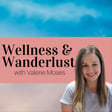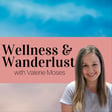
131. Taking Time to Pause, Breathe and Reflect with Michael O'Brien
What can we do to create space in our day to slow down and reflect?
This week's guest is Michael O’Brien, a meditation teacher and the creator of the Pause Breathe Reflect app, which makes mindfulness straightforward and relatable. In July of 2001, Michael was struck head-on by a speeding SUV while he was out cycling. Today, he refers to this as his “Last Bad Day” and shares how that healing journey led to his work in mindfulness and meditation.
In our conversation, Michael shares how that day collided with his sense of identity, how he now incorporates gratitude into his life, and why slowing down can help us ease our suffering. We also discuss ways to use mindfulness to avoid burnout, the power of lovingkindness, how we can create meaning in the difficult moments, and much more.
If you enjoy this episode, please feel free to rate and review the podcast on whatever app you’re listening on, and share with a friend!
OUR SPONSOR
Are you ready to feel more energized, focused, and supported? Go to https://zen.ai/wellnessandwanderlust1 and add nourishing, plant-based foods to fuel you from sunrise to sunset.
CONNECT WITH MICHAEL
Pause Breathe Reflect: https://www.pausebreathereflect.com/
Instagram: https://www.instagram.com/pausebreathereflect/
LinkedIn: https://www.linkedin.com/company/pause-breathe-reflect
CONNECT WITH THE SHOW
Website: WellnessAndWanderlust.net
Instagram: www.instagram.com/wellnessandwanderlustblog
Facebook: www.facebook.com/wellnessandwanderlustblog
Twitter: www.twitter.com/moses_says

